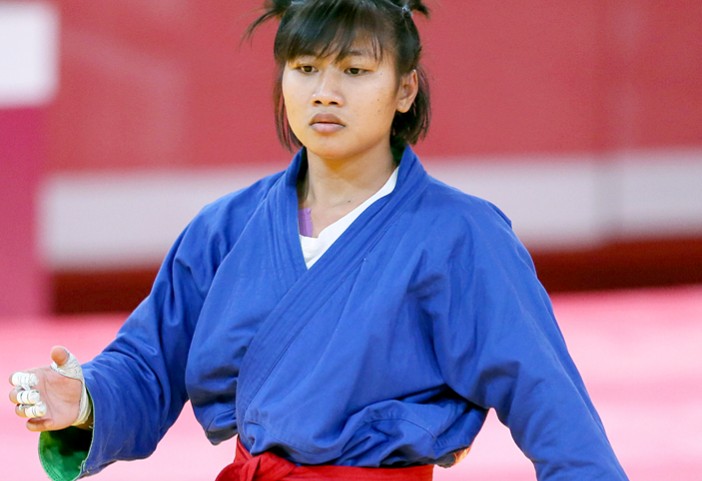Popular Reads
Top Results
Can't find what you're looking for?
View all search resultsPopular Reads
Top Results
Can't find what you're looking for?
View all search resultsAsian Games: Underdog Indonesian shocks favorites to win bronze
Khasani Najmu Shifa was a nobody on the international kurash circuit before the Asian Games. After upsetting several of the world’s favorites in the women’s -63 kilogram semifinals, she is now firmly on the map.
Change text size
Gift Premium Articles
to Anyone
K
hasani Najmu Shifa was a nobody on the international kurash circuit before the Asian Games. After upsetting several of the world’s favorites in the women’s -63 kilogram semifinals, she is now firmly on the map.
Eighteen-year-old Shifa’s name is cemented in history as the first Indonesian fighter to win a medal in kurash. Kurash — an ancient judo-like martial art originating from Uzbekistan — made its Games debut this year.
Shifa was on the cusp of advancing to the final at the Jakarta Convention Center at the Gelora Bung Karno sports complex on Wednesday. However, she failed to hold onto her lead against the more experienced Dildor Shermetova of Uzbekistan, who has won multiple international championships.
Shermetova, the eventual gold medalist in the category, was the 2017 Kurash World Championships winner in Turkey last year.
Shifa, seemingly exhausted after hard-fought battles in the previous rounds, tried her best to keep her feet on the ground against the opponent’s aggressive takedown attempts. Ninety seconds before the time stopped, Shermetova brought down the newcomer with a Chala, the move that awards the least points in the three-point system.
As the match ended in a tie, the winning decision was given to Shermetova as the fighter who landed the last offensive move.
Shifa, despite repeatedly trying to bring down her opponent toward the end of the match, failed to advance to the final but secured a bronze medal.
She said she was disappointed with the result, even though she was not expected to win any medals.
“My personal target was to present Indonesia with a gold medal,” Shifa said after the match with teary eyes, pledging that she would work harder moving forward.
En route to the semifinals, Shifa defeated more experienced athletes, including Zahra Naderibeni of Iran, who won a silver medal at the 2015 Asian Kurash Championships in Lebanon.
“Uzbek fighters have more power, a lot better than us [Indonesians]. I don’t know what they eat and what kind of exercises they do,” said Shifa, who is also a judoka.
Shifa, who hails from Bogor and is currently studying at the Indonesia University of Education in Bandung, West Java, said she was initially told by her father to study martial arts for self-defense.
“The reason why I chose Kurash is because the sport gave me a bigger chance to compete in the Asian Games. I might not have been [selected] if I chose other sports,” she said.
The Indonesian Kurash Association, which was established two years ago, sent 14 athletes — eight men and six women — to compete in the sport.
According to Teuku Riefky Harsya, the association's chairman, the team took part in four tryouts in Turkmenistan, Thailand, Iran and South Korea before competing at the Games.










